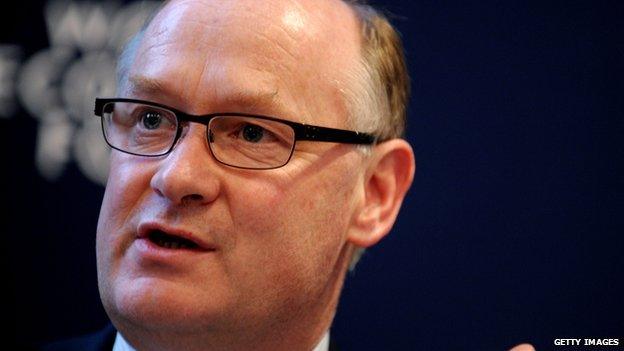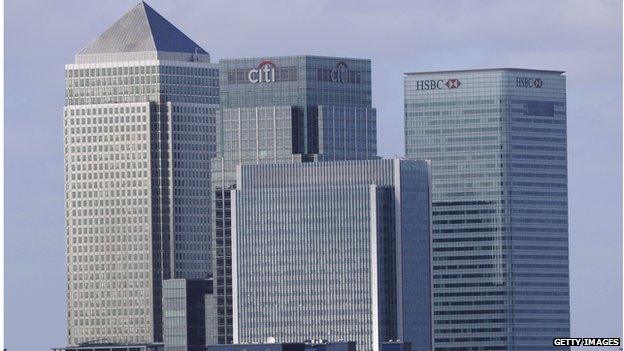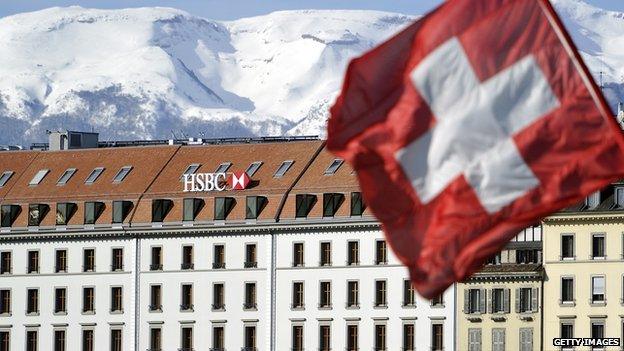Investors heap pressure on HSBC chairman
- Published
- comments

After disappointing results on Monday and a conveyor belt of announcements on misconduct and multi-billion pound fines, there is a palpable feeling of concern among some of HSBC's biggest investors - the institutions that own the bank and rely on its profits to invest in our pension funds and savings.
I have spoken to three significant holders of HSBC stock and they are not very happy. Change at the bank is too slow, they say, and it is time for a new, more radical approach.
Is it time, one significant investor asked, for a change at the top?
Douglas Flint has been the chairman of HSBC since the end of 2010.
He is widely viewed as a man of integrity who makes considered interventions on issues of bank regulation and governance.
He also heads a bank comfortably rated as "adequate" by among others Standard and Poor's for its capital position - a marker of a bank's financial health.

Mr Flint was the financial director at the bank through the financial crisis, a crisis that HSBC weathered better than most with its diversified structure and better management of its cash.
And unlike the Royal Bank of Scotland and Lloyds Banking Group, it did not need a direct bailout by the tax payer.
'Constantly firefighting'
But the credit that Mr Flint has built up over the years is being rapidly used up, according to the leading investors I have spoken to.
One major investor told me of his unhappiness at "a number of things". He said the performance operationally "is not great" and that the investment bank's costs were too high given the modest levels of profit.
"HSBC has been slow at addressing the problems, the bank at the moment is too big and they are constantly firefighting," he said.
"They have run too many red lights. A fresh broom as chairman might help."
Satisfying investors?
Another large investor said he would be raising concerns with HSBC's performance with the bank itself in the near future.
To be clear, that investor made no mention of Mr Flint.
And it also seems that backing for the chief executive, Stuart Gulliver, remains strong.
The three major investors I spoke to supported Mr Gulliver.
I wrote here about why HSBC's annual results had disappointed investors.
And those close to Mr Flint say that he is well aware that he needs to "accelerate" the process of "shrinking to grow", selling businesses around the world to make the bank leaner and more profitable.
It has been an approach welcomed by investors at Lloyds, RBS and Barclays.
This afternoon Mr Flint will appear before the Treasury Select Committee to answer questions about the HSBC Swiss banking arm after allegations it helped customers evade tax between 2005 and 2007.
The key questions will be how much he knew about the problems and what was done to tackle them.
Mr Flint was finance director at HSBC at the time the bank bought Republic New York Corporation and Safra Public Holdings, the businesses that became HSBC Swiss.

As such he would have overseen what is called "due diligence" on the acquisitions - the process of checking that there are no uncomfortable truths hiding in the detail of the deals.
He was also finance director during the purchase of Household bank in America - which collapsed during the financial crisis and left the bank with billions of pounds of losses.
That issue "still sticks in the craw" according to a third leading investor I spoke to. "Don't under-estimate that," he said.
The third deal that Mr Flint faces questions over is the purchase of Mexico's Grupo Financiero Bital.
That operation ultimately landed HSBC with a fine by American regulators of £1.2bn after allegations that it handled money for drug cartels.
'Too big to manage'
HSBC has made it clear that it has rapidly strengthened its compliance and governance systems and that as finance director of a then federated organisation run country-by-country (HSBC operated wholly separate businesses under an overall umbrella group) Mr Flint could not be expected to know the details of every business.
His job, Mr Flint's allies point out, was to ensure the bank's capital position was robust enough to withstand shocks, a responsibility they say he fulfilled and was praised for.
At the heart of this is the issue of "too big to manage".
"Where does responsibility lie?" was how the third disgruntled investor put it to me.
Ahead of HSBC's annual general meeting later this year, Mr Flint will hold a series of meetings with key investors and lay out the bank's plans for improving the business.
Some of the conversations are likely to be uncomfortable.